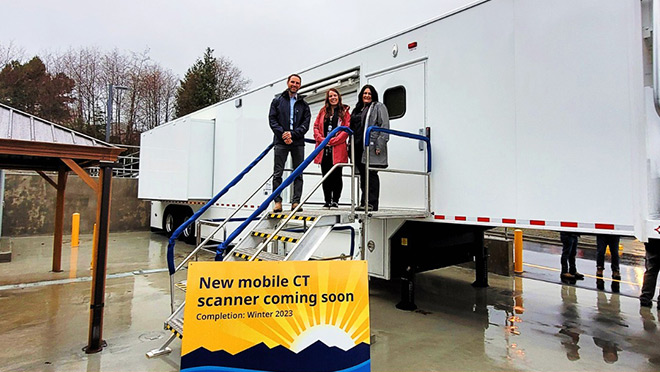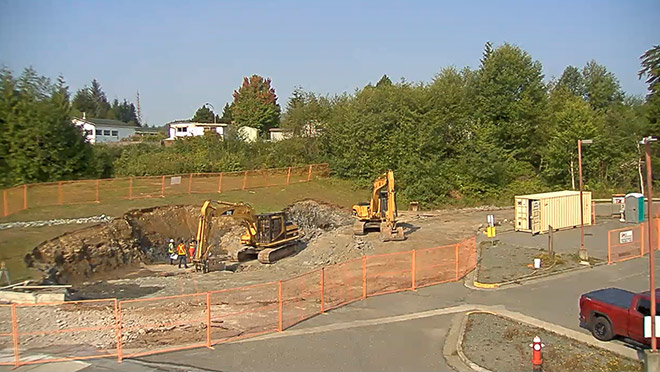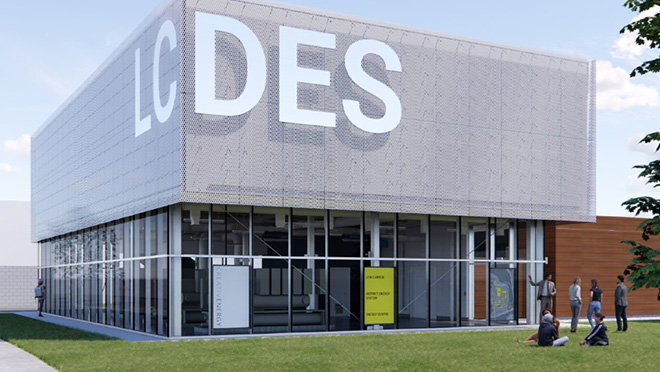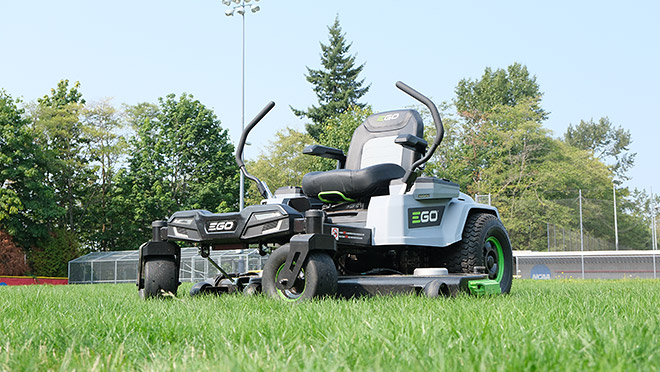North Vancouver Island mobile CT scanners ditch diesel for clean energy

Island Health's mobile scanner plugs in to clean energy at Port Hardy
Part of a series on BC Hydro Clean Energy Champions: businesses, homes, and institutions – large and small – recognized for reducing their reliance on fossil fuels.
What do computerized tomography (CT) scans and movies have in common? They both use film and, thanks to the creativity of BC Hydro key account manager Tera Nelson, they're both taking advantage of an incentive we offer to switch from diesel to clean renewable electricity.
"To be honest, when Tera (Nelson) and I first started communicating on this around April 2023 and she brought in someone from the film initiative, I was thinking 'Why is this person on this call?'," recalls Dave Patten, Island Health's senior project manager for facilities, design, and construction. "And then as we got further into the conversation, it started to make a lot more sense. It's been a really good collaboration. It's been amazing."
Our new clean energy kiosks initiative was primarily aimed at helping the film and TV industry reduce its use of diesel-generated power by plugging into renewable electricity at popular shooting locations around B.C. But why not apply that same idea to mobile imaging, including mobile CT scanners and mobile mammography services?
Mobile imaging is emerging as a great way of serving smaller, more remote communities in B.C. that lack some costly, but vital, equipment in local hospitals. And the arrival of a mobile CT scanner in Port Hardy is being hailed as a game changer for patients in North Vancouver Island communities.
"Normally, what would happen is these patients would have to get someone to bring them down to Campbell River, which is a 2.5 to 3-hour drive," says Alexandra Melanson, manager of medical health imaging for Island Health. "The addition of this new scanner means less travel time for North Vancouver Island residents in need of CT scan diagnostic testing."
The mobile CT scanner at Port Hardy will serve most North Vancouver Island communities north of Campbell River, including Cormorant Island, Port McNeill, Port Alice, and more than a dozen First Nations. In between five-week stints at Port Hardy, the scanner is used at Victoria General Hospital to help reduce waitlists there. But because the Port Hardy Hospital site lacked the electrical capacity to run the scanner, the original idea was to use a diesel generator to power it.
We provided up to $30,000 in funding to help cover the costs of various upgrades at Port Hardy Hospital. This included upgrading two spans of overhead wire to provide the required voltage, replacing two poles, and installing a new three-phase transformer. And there was a major site excavation – including three weeks of excavation work to remove a large rock – along with installation of electrical, mechanical, and plumbing systems.
Once all that was done, a pad for the mobile CT trailer was installed, along with 14 parking stalls, complete with some roughed-in locations for future EV chargers.
Now up and running, the mobile CT scanner operates on clean electricity instead of diesel, avoiding the burning of an estimated 10,000 litres of diesel per year.
"We're really excited about this at Island Health," says Island Health senior project manager Patten. "It brings awareness around our plans to reduce greenhouse gas emissions, eliminating the need of a diesel generator as the source to run the scanner."
The mobile CT scanner project is part of the North Vancouver Island Stabilization Project, which includes increased staffing and services for North Vancouver Island communities. Located at the northern tip of Vancouver Island, Port Hardy has around 4,000 residents but is easily the largest town in the region.
"It was the kind of thing where the customer didn't ask for funding," says Nelson. "But as a key account manager with knowledge of the programs we've developed as part of BC Hydro's electrification program, it was fantastic to be able to offer them something meaningful and to really support them in their drive to reduce emissions in all aspects of their business."

The benefits of a 'really cool, nerdy technology'
North Vancouver Island patients going through cancer treatment, in particular, stand to gain a lot from the arrival of Computerized tomography (CT) scanning at Port Hardy.
CT scans combine a series of X-ray images taken from different angles around your body and uses computer processing to create cross-sectional images of the bones, blood vessels and soft tissues inside your body. And the mobile model being used at Port Hardy Hospital and Victoria General Hospital is low-dose radiation technology that has the computing power to deliver fast results.
"We love our patient care work, and this initiative combines really cool, nerdy technology with the ability to stand next to your patients, hold their hand and look them in the eye," says Island Health medical imaging manager Melanson, who's a trained CT technologist. "You know that you're giving them the best scan that they could possibly get."
Melanson says the scanner will operate 40 hours a week, both for scheduled scans and for emergency scans of patients with trauma from various accidents that occur with some regularity in an area of the Island that is a hotbed for hiking and outdoor recreation. It will also produce the spinoff benefit of a local training opportunity for CT technologist students.
"One of the big problems in these far-flung communities is staffing and retention," she says. "Bringing something like a CT scanner to a place like Port Hardy is not only good for the people who are getting the scans, but good for the people who are now getting the opportunity to train in CT. We're increasing the employee engagement and the opportunities for staff, and that helps your recruitment and retention because it gives people opportunities for advancement within their career."




